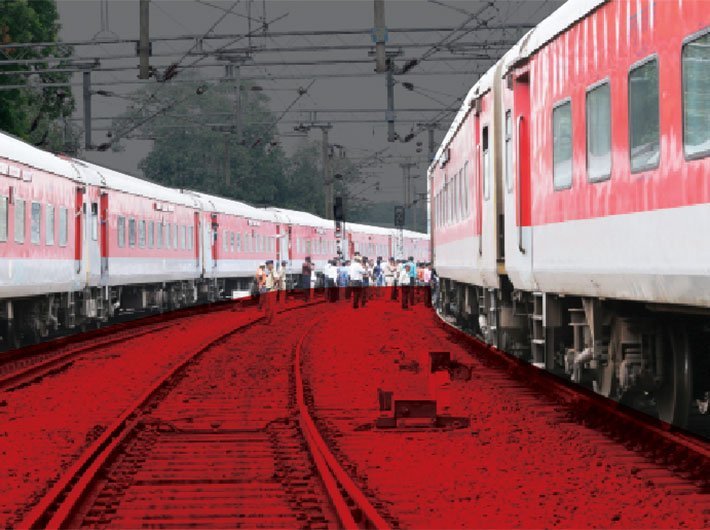The state government, the Indian Railways or the public in general... the blame game continues
The incident was not the railways’ fault. There was no lapse on our part and no action against the driver will be initiated. People should refrain from organising such events near tracks in future. I think if precaution had been taken, the accident could have been averted.” This was minister of state for railways Manoj Sinha’s response just hours after the dreadful train accident in Amritsar on October 19 on the day of Dussehra.
At least 62 people were killed and over were 100 injured after a speeding diesel multiple unit (DMU) train mowed down a huge crowd gathered at the railway track to watch the burning of the Ravana effigy. The railways has categorically denied any responsibility for the accident and has instead passed the buck onto the Punjab government, district police and the local administration.
It has said that it will not conduct either an internal probe or a commissioner railway safety (CRS) inquiry as it maintains that the mishap was a clear case of trespassing.
The Indian Railways’ alacrity in declaring itself not guilty for the unfortunate incident reflects its callous attitude. Its insensitivity is further highlighted by the fact that it is not yet said it will find out ways to avoid such mishaps in the future. The national carrier is more interested in giving itself a clean chit. Railway board chairman Ashwani Lohani has said trespassing is the only reason for the mishap.
The incident happened on the Amritsar-Manawala section when a speeding Jalandhar-Amritsar DMU train ploughed through a massive crowd that was standing on the tracks to watch the burning of Ravana’s effigy on Dussehra in Jaura Phatak. It is said that in the midst of cracker bursting, people could not hear the train which ran over them. Firozpur division of the northern railway says the train was moving at a speed of around 65 kmph when the accident happened and it blew horn many times but people standing onto the tracks could not hear the train approaching towards them.
Lohani said the DMU train was moving at an assigned speed of 90 kmph and the driver had applied the brakes and brought it down to 65 kmph but by that time it was too late.
Sources in the railway ministry said that after the incident took place, the driver tried to stop the train but after seeing enraged crowd pelting stones on the train, he took it to the next station.
The railways have defended the DMU train driver for not stopping at the accident site as people’s anger could have resulted into another frightful tragedy.
Northern Railway’s chief public relations officer (CPRO) Deepak Kumar maintains that Firozpur division will not investigate the incident and no compensation has been granted by the railways.
None of the top railway board officials at the Rail Bhavan are willing to comment on the issue. On one hand, the railways is maintaining that it has no role in the incident, while on the other hand it is dodging media queries.
Asked who is responsible for the unfortunate incident, railway ministry spokesperson Smita Vatsa Sharma refused to comment and suggested to wait for some time to get more details of the incident.
The officials have ruled out that there was any intelligence failure on part of the railways. They said that even if there was any, it solely rests with the state government, the district police and the local administration.
Sunil Kumar, former advisor (safety), railway board, says that considering the sensitivity of the incident, the Indian Railways should conduct a certain level of enquiry.
He says by arguing that trespassing is the only reason behind people’s death will do no good to the railways. There was a case in 1985 in Kerala where people were witnessing some festival celebration in a temple near a railway track and were run over by a train. In that case an inquiry was set up by the railways, he recalls. “If I am running a train, do I have a licence to kill people? Whosoever has done the mistake, it should be examined how people’s lives could have been saved,” Kumar adds.
“Primarily, the railways can’t be held responsible for this incident but a secondary investigation is needed for introspection. If not the CRS inquiry, some other level of inquiry should be conducted,” he says.
He says not only people and the organisers but the state government and railways also took the entire incident casually.
Vivek Sahai, who was chairman of the railway board between 2010 and 2011, says a lot of public functions frequently take place near railway tracks and the national carrier should ensure that encroachments should not be there on 30 feet either side of the tracks.
He says there was no clear fault of the railways but it was a simple case of mistake on part of the railways.
Sahai adds the railways should ask organisers of such functions to put a temporary fencing around the tracks to prevent trespassing and save precious lives.
He says drivers of the passing trains usually exchange ‘alright’ signals with each other to indicate the tracks are safe to go ahead. But here, the driver of the Amritsar-Howrah express train did not raise an alarm with Jalandhar-Amritsar DMU. By the time the driver of DMU could understand what was happening around the tracks, the train had already ploughed down people, Sahai says.
He says the railways could not prevent such incidents where people trespass on the tracks.
A senior official of the coaching department says a gateman’s duty is to keep an eye on the level crossing and manage the crowd when trains are coming on the track. The visibility of an engine’s headlight is barely 40-50 metres beyond which the driver can’t see anything. It is believed that the driver was also unable to spot people spilling on the track because of the brightness of a giant screen erected near the tracks and cracker bursting, he says, adding, the driver was not at all at fault. The local administration should have taken responsibility of managing the massive crowd. It was the intelligence failure on their part not on the railways’ part.
The official says the railways orders an enquiry only if something wrong has happened on the block section of the railways and a train has derailed or passengers have died.
He adds that the organiser of the dussehra event had turned the big screen (which was beaming live show of Ravana’s effigy burning) towards the railway track which prompted people to watch it while standing onto the tracks.
As an instance, if a robbery has happened in the train then it is the responsibility of Government Railway Police (GRP) to investigate the matter and not the railways. Similarly, in this case, local administration, GRP and district police should have a probe to find out reasons behind the mishap and the railways should not be asked to investigate the incident, he says.
It seems none of the departments involved in the incident are ready to introspect on the reasons behind the mishap that snuffed out 62 people on Dussehra.
(The article appears in November 15, 2018 edition)



